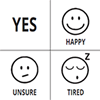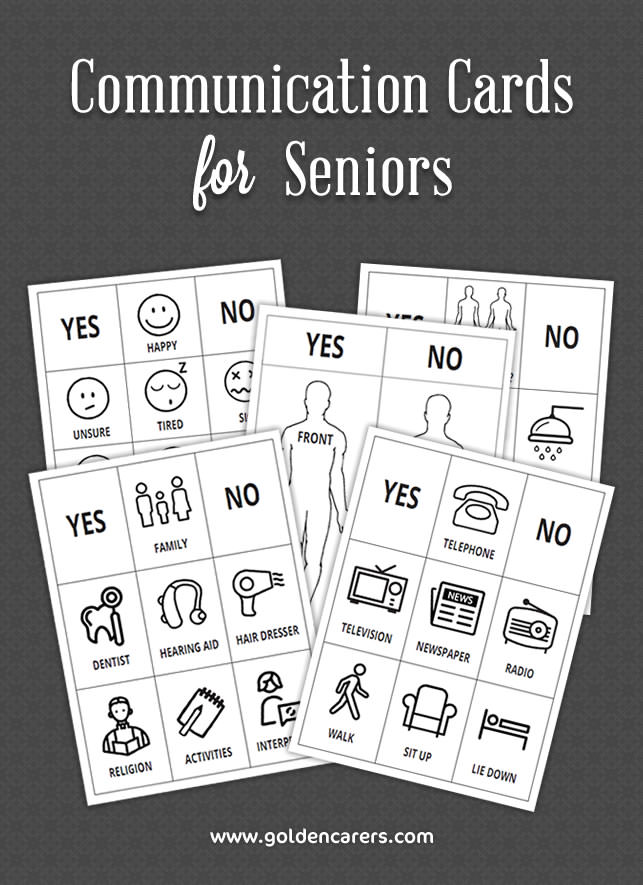
Cue Cards for Dementia Care
Found In: ›Activities ›Alzheimer's & Dementia ›Articles ›Forms & Templates ›Multicultural

Related Activities
Comments Post a Comment
 29th Jun 2021
Leisure & Lifetyle Coordinator
29th Jun 2021
Leisure & Lifetyle Coordinator
One thing is that they can't be saved as separate pages. I'll have to print them and scan them and then place them in the document.
Again thanks for your help.
 18th Jan 2023
Activity Director
18th Jan 2023
Activity Director
Hope this helps.
 28th Feb 2021
Allied Health Assistant
28th Feb 2021
Allied Health Assistant
 1st Mar 2021
1st Mar 2021
The multicultural ones shared previously are also great:
https://www.healthtranslations.vic.gov.au/bhcv2/bhcht.nsf/PresentDetail?Open&s=Cue_Cards
Good luck, I hope it all works out well.
 28th Oct 2019
diversional therapist
28th Oct 2019
diversional therapist
I would like to fine sentence in other languages. Does anyone have any ideas or where I could get this
 29th Jan 2019
Information Coordinator
29th Jan 2019
Information Coordinator
And our library has a wide range of communication cards and guides at https://library.mac.org.au we often recommend lifestyle workers to borrow the product from us to trial it, before purchasing it, as many of the products on the market can be quite pricey!
 31st Jan 2019
Diversional Therapist
31st Jan 2019
Diversional Therapist
 27th Jan 2019
27th Jan 2019
 5th Sep 2018
Lifestyle Coordinator
5th Sep 2018
Lifestyle Coordinator
 8th Sep 2018
8th Sep 2018
 23rd Oct 2017
Lifestyle
23rd Oct 2017
Lifestyle
 28th Oct 2017
28th Oct 2017
 22nd Feb 2017
Director Of Activities
22nd Feb 2017
Director Of Activities
http://www.healthtranslations.vic.gov.au/bhcv2/bhcht.nsf/PresentDetail?Open&s=Cue_Cards
 27th Feb 2017
27th Feb 2017
 14th Jun 2016
Aged Care and Community Services
14th Jun 2016
Aged Care and Community Services
http://www.coasit.asn.au/cald-resources/
 17th May 2016
Activities Coordinator
17th May 2016
Activities Coordinator
 18th May 2016
18th May 2016
 13th May 2016
activity specialist
13th May 2016
activity specialist

 11th May 2016
11th May 2016
 10th May 2016
Certified Therapeutic Recreation Specialist
10th May 2016
Certified Therapeutic Recreation Specialist
 10th May 2016
Recreational Activity Officer Coordinator
10th May 2016
Recreational Activity Officer Coordinator
 10th May 2016
10th May 2016

 10th May 2016
10th May 2016

 10th May 2016
Diversional Therapist
10th May 2016
Diversional Therapist
 10th May 2016
Diversional Therapist
10th May 2016
Diversional Therapist
 10th May 2016
Lifestyle Coordinator
10th May 2016
Lifestyle Coordinator

 10th May 2016
Diversional Therapist
10th May 2016
Diversional Therapist
 10th May 2016
Carer / Activity Coordinator
10th May 2016
Carer / Activity Coordinator

 Fill out the form please
Fill out the form please
 What Am I? Animal Quiz
What Am I? Animal Quiz
 Guess the Animal Visual Quiz
Guess the Animal Visual Quiz
 Rolling Hills Scrapbook Collage
Rolling Hills Scrapbook Collage

